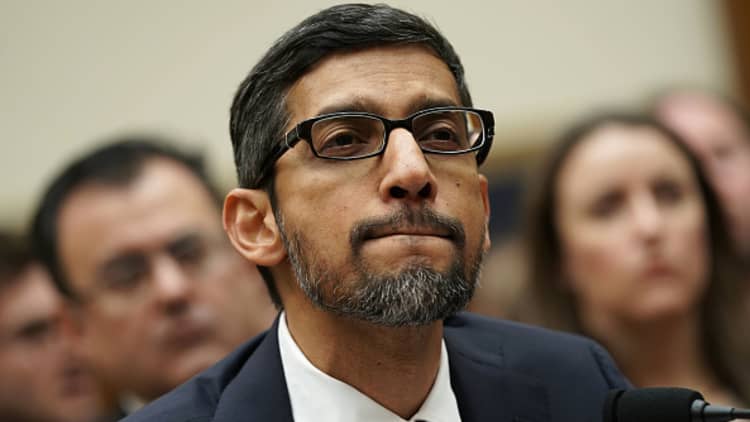It was Sundar Pichai's turn in the congressional hot seat.
Google's CEO testified before the House Judiciary Committee on Tuesday for 3.5 hours while lawmakers grilled him on a wide range of issues, including potential political bias on the company's platforms, its plans for a censored search app in China and its privacy practices.
This is the first time Pichai has appeared before Congress since Google declined to send him or Alphabet CEO Larry Page to a hearing on foreign election meddling earlier this year. That slight sparked anger among senators who portrayed Google as trying to skirt scrutiny.

Tuesday's hearing culminated a tough year for big tech companies, as lawmakers and the public have become increasingly skeptical about Silicon Valley's effects on democracy, misinformation and privacy. Despite some occasionally intense questioning, the soft-spoken Pichai remained cool and confident overall throughout the proceedings as he either defended Google or expertly dodged giving specific answers.
Accusations of manipulation
Tuesday's hearing was titled "Transparency & Accountability: Examining Google and its Data Collection, Use, and Filtering Practices" and many representatives posed questions on whether or not Google's search results were biased against conservative points of view.
This has been a consistent narrative over the past year, as Republican lawmakers — and even President Donald Trump — have accused Google and other tech platforms of suppressing conservative voices. Pichai echoed Google's previous denials, and repeatedly responded that Google's search algorithms did not favor any particular ideology, but instead surfaced the most relevant results, which could be affected by the time of a users' search, as well as other factors like their location.
One particularly fiery take against that line of questioning came from Rep. Ted Lieu (D-Ca.) who said that the queries on conservative bias "wasted time" given that private, profit-seeking companies like Google are protected by the First Amendment. Even if Google was biased, he said, that would be its right. However, he also used sample Google searches to show that Google would turn up positive search results about Republicans and negative search results about Democrats.
"If you want positive searches, do positive things," Lieu said. "If you get bad press, don't blame Google. Consider blaming yourself."
Lieu has made similar points at past hearings that included Facebook, Twitter, and Alphabet.
Several representatives brought up other kinds of bias.
Google is by far the most popular search engine in the world, with more than 90 percent market share, according to StatCounter, but the process of how exactly Google's platforms surface search results are complicated and opaque. Regulators and competitors like Yelp have criticized Google for surfacing its own services, like maps, jobs postings, business reviews and travel information over information from other websites. Last year, the EU slapped Google with a $2.7 billion antitrust fine for its shopping results.
"I strongly support an open, decentralized internet that is free of powerful gatekeepers with the ability to discriminate against rivals, threaten innovation or harm consumers," Rep. David Cicilline (D-RI) said, and asked whether Google would commit to ending any discriminatory practices against competitors.
In response, Pichai said that Google "provides users with the best experience and the most relevant information," and denied that the company used discriminatory practices in its search results. When Cicilline pushed him on whether Google would support some kind of antitrust legislation, Pichai vaguely answered that Google would be "happy to engage constructively on legislation in any of these areas."
Pichai was evasive on China plans
Another topic that came up multiple times was Google's plan to launch a censored search engine in China. The Intercept first reported details of the project over the summer, which would block search results for queries that the Chinese government deemed sensitive, like "human rights" and "student protest" and link users' searches to their personal phone numbers.
One of the first specific questions about Google's plans in China came from Rep. Sheila Jackson Lee (D-Tx.) who expressed concern that Google would aid in the oppression of Chinese people "looking for a lifeline of freedom and democracy."
"Right now, we have no plans to launch search in China," Pichai answered, adding that access to information is "an important human right."
Pichai has said in the past that Google is "not close" to launching a censored search result in China, though Tuesday's comments appear to further distance the company from those efforts. The Intercept reported in September that at one point Google employees working on the "Project Dragonfly" efforts were told to get it in "launch-ready state" to roll out upon approval from Beijing officials.
Pichai would not, however, go so far as to commit not to launch "a tool for surveillance and censorship in China," as he was asked to do by Rep. David Cicilline (D-RI).
"We always think it's in our duty to explore possibilities to give users access to information," Pichai said.
Human rights groups and Google's own employees have spoken out publicly about this issue, with more than 730 recently signing an open letter calling on the company to cancel its efforts, and lawmakers at Tuesday's hearing made it clear that they, too, are extremely wary of any plans by Google to work with China's oppressive regime.
Data privacy and hate speech
A handful of representatives also asked Pichai about how transparent Google is when it comes to its data collection practices. The company came under fire earlier this year after The Associated Press revealed that contrary to what a user might reasonably assume, pausing "Location History" tracking on a Google account didn't actually stop the search giant from storing time-stamped location data. Google ended up clarifying the language of its policy.
At the hearing, Pichai said that more than 160 million people had checked their Google privacy settings in the last month, but that Google wanted to make it even easier for "average users" to control their data.
"We always think that there is more to do," Pichai said. "It's an ongoing area of effort."
In regards to data privacy, Rep. Ted Poe (R-Tx.) got rather heated as he asked Pichai whether Google could track his movements if he moved from one side of the room or the other. When Pichai said that he'd need to check the phone's settings to know, Poe interrupted to say that it wasn't a "trick question."
A New York Times investigation on Monday revealed that popular apps like WeatherBug and GasBuddy track users' location with incredible detail and then either send or sell that data to advertisers and retailers, and that Google's Android operating system has more apps that closely track users' location than Apple's iOS. While Poe's line of interrogation didn't quite hit the mark — he was asking specifically about his device, an iPhone, without specifying whether he had any of Google's apps, like Maps, which logs location data, downloaded — his questions and others' made it clear that representatives on both sides of the aisle are concerned about how Google collects and protects user data as well as frustrated by how the company explains its policies.
In that vein, Google's social network snafu also came up multiple times during the testimony.
Google revealed Monday that a security bug allowed the profile information of 52.5 million Google Plus users to be viewable by developers, even if their profiles were set to private. This is the second Google Plus flaw of the year. In October, The Wall Street Journal reported that Google didn't disclose its first one for months because it feared regulatory scrutiny and damage to its reputation.
Pichai acknowledged during his testimony that under the General Data Protection Regulation (GDPR) that came into effect in the European Union earlier this year, companies are required to disclose personal data breaches no later than 72 hours after the company is aware of them. However, Google has previously maintained that its Google Plus issues were not "breaches," since it didn't find evidence that any third parties had accessed or misused the data.
In response to a later question about GDPR, Pichai said that there was "some value for companies to have consistent global regulation," and highlighted how Google published its own framework to guide data privacy legislation earlier this year.
Hate speech and misinformation were another thorny topic that came up several times. Rep Jamie Raskin (D-Md.) in particular cited YouTube videos promoting a conspiracy theory that Hillary Clinton and other politicians and celebrities were drinking children's blood.
"We are constantly undertaking efforts to deal with misinformation," Pichai said, adding that Google is looking to do more.
It's a well-worn struggle for Google, as well as platforms like Twitter and Facebook. These platforms generally want to allow users to post a wide range of content, while curtailing hate speech through Community Guidelines that can be hard to enforce from both a technological and policy perspective.
What we didn't hear
One topic that didn't come up during the hearing was Google's decision earlier this year not to renew a Pentagon contract for analyzing drone videos using artificial intelligence. Google dropped that project, called Maven, following employee protests through petitions and resignations. Pichai subsequently published an artificial intelligence ethics code that Google would work with the government and military on cybersecurity and training, but not on weapons or surveillance that violate "internationally accepted norms."
In his prepared remarks ahead of Tuesday's hearing, Pichai emphasized Google's patriotism, a stance that seemed aimed at appeasing critics who saw Google's abandonment of Project Maven as turning its back on the Department of Defense.
However, lawmakers didn't probe Google on Maven or its stance on working with the military more broadly.
Another thing that didn't appear amid the partisan jabs was any real indication that Congress is on its way to making meaningful progress towards curbing Google and other tech giants' power or passing legislation that protects consumer privacy.
You can watch a stream of the hearing in its entirety here:



